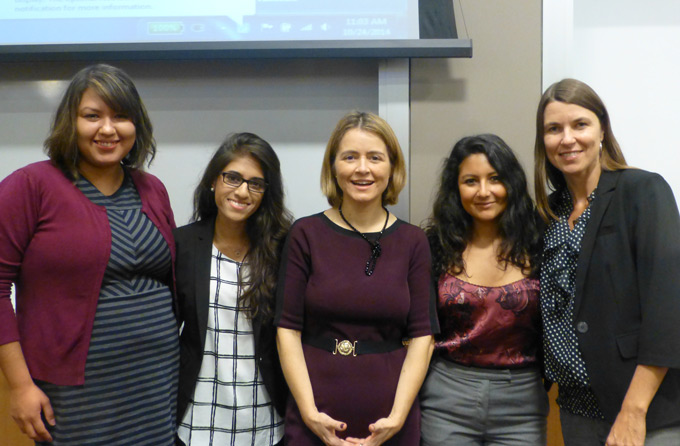
Lupe Aguirre ’16, Neelam Mohammed ’16, UN Special Rapporteur on the human right to safe drinking water and sanitation Catarina De Albuquerque, Leslie Morales ’16, and International Human Rights Law Clinic instructor Allison Davenport ’04
By Andrew Cohen
The human rights implications of several environmental practices took center stage recently during a compelling event at Berkeley Law. A clear takeaway from the Consultation on Environmental Issues: the United States faces challenges as diverse and expansive as the country itself.
The gathering was part of the Universal Periodic Review, a process through which the United Nations Human Rights Council assesses the human rights records of member states. Each UN member is encouraged to engage relevant actors on key issues related to the review. In January, the U.S. government will submit a report to the Council in advance of its spring review.
The Consultation—the only one held on environmental issues in the U.S.—was organized by the International Human Rights Law Clinic (IHRLC). Clinic students Lupe Aguirre ’16, Neelam Mohammed ’16, and Leslie Morales ’16 helped coordinate the event, which brought high-level officials from seven federal agencies to Berkeley Law—including the Department of State, the Environmental Protection Agency, and the Department of the Interior, among others.
“These students worked tirelessly over the course of several months in planning for this,” said IHRLC clinical instructor Allison Davenport ’04. “The Consultation was an opportunity to see first-hand how human rights are made real for communities, and how the public can help identify gaps in fulfilling those rights and provide important input in creating solutions.”
Non-profit leaders, academics, and other private-sector experts joined the government officials in airing and addressing concerns related to climate change, water, and public health. In addition to those in attendance, participants included dozens of others from Boston to Alaska—including a tribal council officer, geologist, sociology professor, and reverend—who took part via conference call.
Davenport called the event “yet another avenue for us to facilitate engagement between the public and government officials on these crucial issues.”
Navigating water hazards

Protection Agency addresses the crowd
While California became the first state to legislate that all human beings have a right to safe drinking water in 2012, Consultation participants noted a growing number of obstacles to realizing that right.
Colin Bailey of the Environmental Justice Coalition for Water noted that 20 million Americans get their drinking water from initially-contaminated sources—2 million of whom in areas with no decontaminating mechanisms. “A disproportionate number of minorities and low-income people live in these areas,” Bailey said.
Patricia Jones of the Unitarian Universalist Service Committee described how more families are facing economic strife at a time when more utilities are raising their rates. “We’ve had mass shutoffs in Detroit, an average water bill of $50 per head per month in Boston, and huge late-payment fees across the country,” she said. “We need to talk seriously about the effect of these punitive measures.”
Omar Carrillo of the Community Water Center in California’s Central Valley explained how the ongoing drought has exacerbated water problems for low-income communities. “We’re seeing growing levels of nitrates, arsenic, and other chemicals in their water,” he said, noting the emergence of black-market water peddlers in poor areas.
“Access to safe and affordable drinking water isn’t only a technical question, but a financial one,” said Michael Kiparsky of the Center for Law, Energy & the Environment (CLEE). “Not having that access can have impacts that go well beyond the lack of water alone.”
The associate director of CLEE’s Wheeler Institute for Water Law and Policy, Kiparsky moderated a panel discussion of the myriad water-related dilemmas facing California and the nation—a continuation of Berkeley Law’s wide-ranging efforts on water issues—and Professor Daniel Farber moderated an earlier panel on climate change.
A continuing effort
IHRLC’s work on the right to water began in 2012 when Dr. Inga Winkler—legal adviser to the UN Special Rapporteur on the human right to safe drinking water and sanitation, Catarina De Albuquerque—spent six months in residence at the clinic. IHRLC hosted De Albuquerque on Oct. 24, when she met with clinic students and gave a public talk on campus.
The UN’s top water law authority since 2008, De Albuquerque conducted a formal mission to the U.S. in 2011. She made several recommendations in her report to the UN about the needs of marginalized communities in California—which boosted efforts to pass state legislation on the issue.
Last year, IHRLC released a report on California’s Human Right to Water Bill that provided an implementation framework for state agencies. “We’ve continued to engage with agency officials on implementation of the law,” Davenport said. “In November 2013, we hosted a convening of agency representatives in Sacramento, where we developed an implementation tool for agencies to adopt and use in their work to ensure marginalized communities are considered in forming water policies and related practices. This year, we’ve focused on bringing the attention of international bodies to the issues, which the current drought crisis is making even more acute.”
IHRLC pursued that goal by filing reports with the UN Committee on the Elimination of Racial Discrimination in August, and with the UN Human Rights Council in September. Both focused on water issues in California, in particular those facing low-income rural and indigenous communities. While the challenges are many, clinic leaders plan to continue their efforts at both the local and international levels to promote universal access to safe and affordable water.